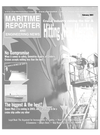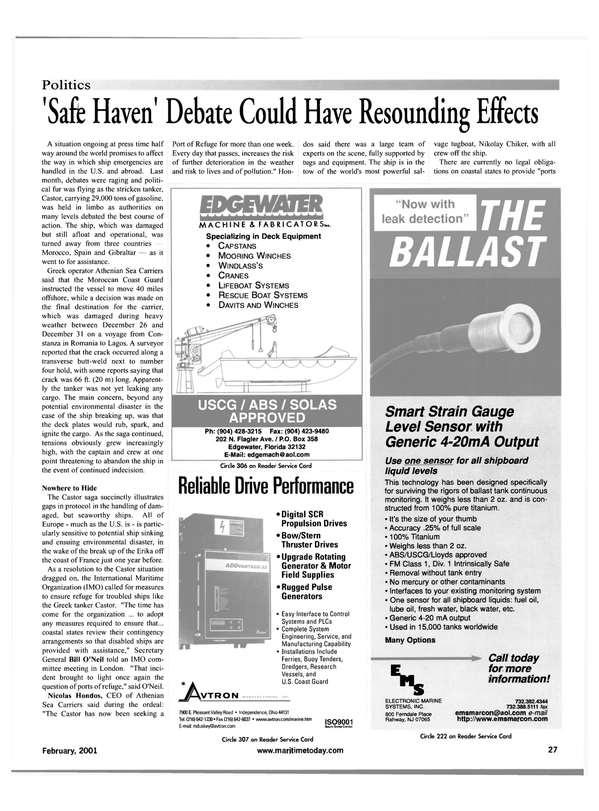
! Safe Haven1 Debate Could Have Resounding Effects
A situation ongoing at press time half way around the world promises to affect the way in which ship emergencies are handled in the U.S. and abroad. Last month, debates were raging and political fur was flying as the stricken tanker, Castor, carrying 29,000 tons of gasoline, was held in limbo as authorities on many levels debated the best course of action. The ship, which was damaged but still afloat and operational, was turned away from three countries Morocco, Spain and Gibraltar — as it went to for assistance.
Greek operator Athenian Sea Carriers said that the Moroccan Coast Guard instructed the vessel to move 40 miles offshore, while a decision was made on the final destination for the carrier, which was damaged during heavy weather between December 26 and December 31 on a voyage from Constanza in Romania to Lagos. A surveyor reported that the crack occurred along a transverse butt-weld next to number four hold, with some reports saying that crack was 66 ft. (20 m) long. Apparently the tanker was not yet leaking any cargo. The main concern, beyond any potential environmental disaster in the case of the ship breaking up, was that the deck plates would rub, spark, and ignite the cargo. As the saga continued, tensions obviously grew increasingly high, with the captain and crew at one point threatening to abandon the ship in the event of continued indecision.
Nowhere to Hide The Castor saga succinctly illustrates gaps in protocol in the handling of damaged, but seaworthy ships. All of Europe - much as the U.S. is - is particularly sensitive to potential ship sinking and ensuing environmental disaster, in the wake of the break up of the Erika off the coast of France just one year before.
As a resolution to the Castor situation dragged on, the International Maritime Organization (IMO) called for measures to ensure refuge for troubled ships like the Greek tanker Castor. "The time has come for the organization ... to adopt any measures required to ensure that...
coastal states review their contingency arrangements so that disabled ships are provided with assistance," Secretary General Bill O'Neil told an IMO committee meeting in London. "That incident brought to light once again the question of ports of refuge," said O'Neil.
Nicolas Hondos, CEO of Athenian Sea Carriers said during the ordeal: "The Castor has now been seeking a Port of Refuge for more than one week.
Every day that passes, increases the risk of further deterioration in the weather and risk to lives and of pollution." Hondos said there was a large team of experts on the scene, fully supported by tugs and equipment. The ship is in the tow of the world's most powerful salvage tugboat, Nikolay Chiker, with all crew off the ship.
There are currently no legal obligations on coastal states to provide "ports of refuge" nor is there a definition of what constitutes a "ship in distress," an IMO spokesman said.
On December 8, the damaged VLCC Eastern Power, carrying 250,000 tons of Iraqi crude, was refused entry to Canadian waters after it reported a minor leak during heavy storms. It eventually continued through heavy seas to St. Eustatius in the Caribbean for the cargo to be offloaded. The tanker Erika was also refused refuge in December 1999 before it broke apart in a storm, leading to a major spill of fuel oil across the coastline of Brittany.
Read ! Safe Haven1 Debate Could Have Resounding Effects in Pdf, Flash or Html5 edition of February 2001 Maritime Reporter
Other stories from February 2001 issue
Content
- Plug & Play page: 36B
- Uniservice: Innovative Product Keeps Cruise Ships Running page: 36C
- Transas Expands Capabilities page: 36G
- Kvaerner Conducts Sea Trials; Docks Out New Cruise Vessels page: 36A
- Drew Offers Electronic Steam System Monitoring page: 36H
- Crystal Cruises Signs Contract For New Ship page: 5
- Mediterranean Shipping Orders New Cruise Ship page: 5
- Two-Stroke Milestones page: 8
- Dear President Bush... Reasons for More Title XI Funding page: 11
- Real Time, On-line Credit Services Offered page: 14
- Major Ocean Carriers Partner To Launch E-Commerce Solution page: 15
- San Francisco Bay Area Company Leads in NOX Reduction page: 16
- Alabama Shipyard Signs Another Tug/Barge Contract page: 17
- Bollinger To Construct Supply Boat Trio page: 19
- Curacao Carves A Cruise Niche page: 20
- U.S. Lines' MS Patriot Challenges Cascade General page: 21
- Royal Caribbean Stock Downgraded page: 25
- ! Safe Haven1 Debate Could Have Resounding Effects page: 27
- ABS Under Fire, Fights Back page: 29
- Queen Mary 2: Cunard's Answer to Royalty on the Seas page: 30
- Kaparis Defines Safety on Cruise Ships page: 32
- The Dickinson Way page: 34
- Oceancell by GEOLINK: The First GSM Solution Via Satellite Aboard Ships page: 40
- Heroes on the High Seas page: 43
- MAVCO Onboard Explorer Of The Seas page: 49
- New Cat-Powered Tugboat Ordered As Gdansk Gears Up For Port Growth page: 58
- ARCOMS Appoints President For Subsidiary page: 61
- Grat Cruise Ships of 2000 page: 71
- The Cradle of Cruising Creativity? page: 72


